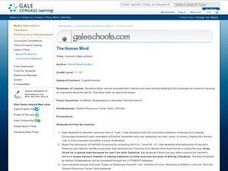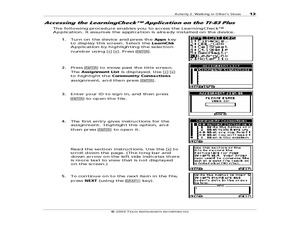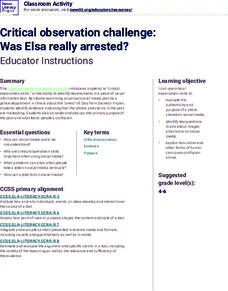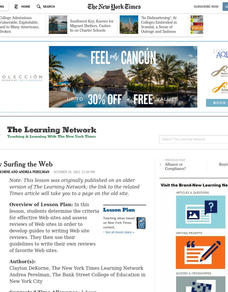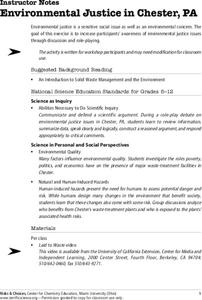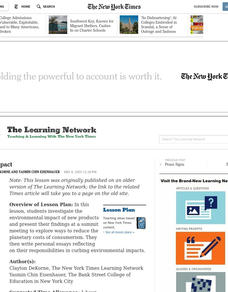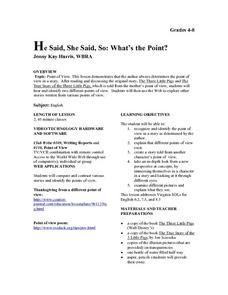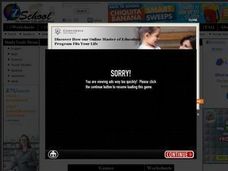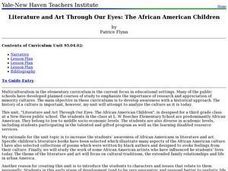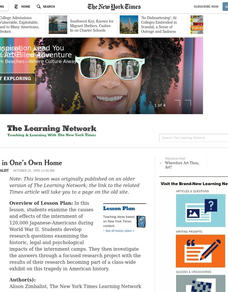Curated OER
Hamlet's State of Mind
Analyze various excerpts from Hamlet and read articles to develop an argument about his sanity. Middle and high schoolers write an argument essay defending whether or not they believe Hamlet is insane. You could modify this assignment...
Curated OER
Creating Classroom Rules
Perfect for establishing classroom protocols, this activity gets even the youngest learners thinking about rules and their consequences. The lesson begins with a discussion and a reading of the poem Humpty Dumpty that gets youngsters...
Curated OER
The Language of Surprise
Aspiring writers complete and discuss fill-in-the-blank cliché expressions, define cliché as a form of predictable writing, take cliché expressions and turn them into new, unpredictable ones, read poetry that illustrates writer's use of...
Curated OER
School-Home Links/Book Links
Get youngsters reading at home and their parents involved with this at home reading assignment. This resource consists of a ready-to-use handout for documenting at-home reading. Formatted as a letter home to parents, this activity calls...
Curated OER
Using Drama to Examine Communities: Walking in Others' Shoes
Encourage your readers to make connections between texts with this resource. After compiling notes for each text read (you choose the texts), groups craft skits in which major characters from each text meet. There is a rubric for the...
Curated OER
Christopher Columbus: The Man, the Myth, the Legend
Learn more about maps by examining Christopher Columbus's voyage to the New World. Kindergartners will learn about basic map skills and how to identify the compass rose, oceans, and land masses. They will also discover the purpose of...
News Literacy Project
Critical Observation Challenge: Was Elsa Really Arrested?
A 14-slide presentation showcases a social media post featuring Disney's Elsa from the movie, Frozen. The seemingly harmless post received lots of attention, raising the question, how do we know posts are factual? Scholars go through...
Curated OER
Critically Surfing the Web
The New York Times article “Online Diary,” launches this study of websites and how to assess them. Richly detailed, the lesson includes warm-up activities, procedures, journal prompts, discussion questions, and links to valuable...
Curated OER
Environmental Justice in Chester, PA
Over several days, learners communicate and defend an argument regarding environmental justice issues in Chester, PA. After discussing the issue and viewing a video about the location of several toxic waste facilities in Chester, they...
Curated OER
Propaganda
How does word choice affect the reading of a text? Compare two headlines that were written about the same event. Is one biased? Discuss how word choice often reveals the author's feelings about a topic. Then look at different techniques...
Digital Public Library of America
Beloved by Toni Morrison
Any classroom study of Toni Morrison's Pulitzer Prize-winning novel Beloved requires careful planning and scaffolding. A primary source set that includes a video, illustrations, photos of artifacts, and a broadside of the Fugitive Slave...
Curated OER
Budget Busters
Use this economic activity to focus on writing summaries of informational text. First, middle schoolers define common economic terms used to describe news about the economy. They closely read news about the federal budget deficit and...
Curated OER
Deep Impact
How can acknowledging opposing viewpoints reinforce one's argument? Use this New York Times lesson to study consumerism and the environmental impact of new products. After reading the article "Whether a Hummer or a Hybrid, the Big...
Curated OER
He Said, She Said, So: What's the Point?
Not by the hair on my chinny chin chin! Upper graders and middle schoolers read the story The Three Little Pigs and other tales related to the story from various points of view. They use the Internet to find more stories from...
Curated OER
Pioneer Values in Willa Cather's My Antonia
Included in this resource are a variety of activities to do while reading Willa Cather's My Antonia. The activities, which range from mapping out Nebraska to writing activities about pioneer living, are all designed with one guiding...
Curated OER
Deck the Halls with Literature Trees
Reinforce and assess reading comprehension by having your class make a literature tree! After reading a book, pupils make decorations to represent the book's themes, characters, and setting. Materials for decorating can be as diverse and...
Curated OER
Cite Your Sites!
The New York Times article “Lessons in Internet Plagiarism,” launches a look at how the Internet has increased the prevalence of plagiarism. The richly detailed lesson includes warm-up and wrap-up activities, discussion questions,...
Curated OER
The Scarlet Letter Vocabulary Words--Set 2--Choose Cards
Here is a fun way to study vocabulary from The Scarlet Letter. Learners review 35 vocabulary words from the novel by matching and the correct term to definition. Tip: Have the class engage in vocabulary practice prior to reading the...
Curated OER
Showdown in the New Wild West
What is the root of the conflict between ranchers and environmentalists? Middle schoolers write their impressions of what an environmentalist is and does. They read the New York Times article "In New Wild West, It's Cowboys vs. Radical...
Curated OER
Showdown on the Frontier
Especially critical following a series of shootings in schools, theaters, and religious buildings, it's safe to say that we need to evaluate the current laws on gun control. Eighth graders read a New York Times article in order to better...
Curated OER
Literature and Art Through Our Eyes: African-American Artists
Examine the contributions of African-Americans in the worlds of art and literature. Over the course of a few days, young scholars will read and analyze a poem, a short story, and a piece of art. They complete a range of...
Curated OER
Structured Academic Controversy (SAC) in the History Classroom
SAC is a specific approach to discussing history and controversial issues. Rather than adhering to an either/or debate-style paradigm, it fosters speaking and constructivist listening to enable learners to build consensus through...
Curated OER
Let There Be Peace: Nobel Prize Winners
What is the Nobel Peace Prize? After they establish criteria for great leadership, secondary learners read a New York Times article about President Jimmy Carter's acceptance of the Nobel Peace Prize in 2002. Individuals research the...
Curated OER
Prisoner in One's Own Home
Examine the internment of Japanese-Americans during World War II. After reading an article from the New York Times and exploring the author's word choice, young readers find the central idea in the text and work on researching additional...


